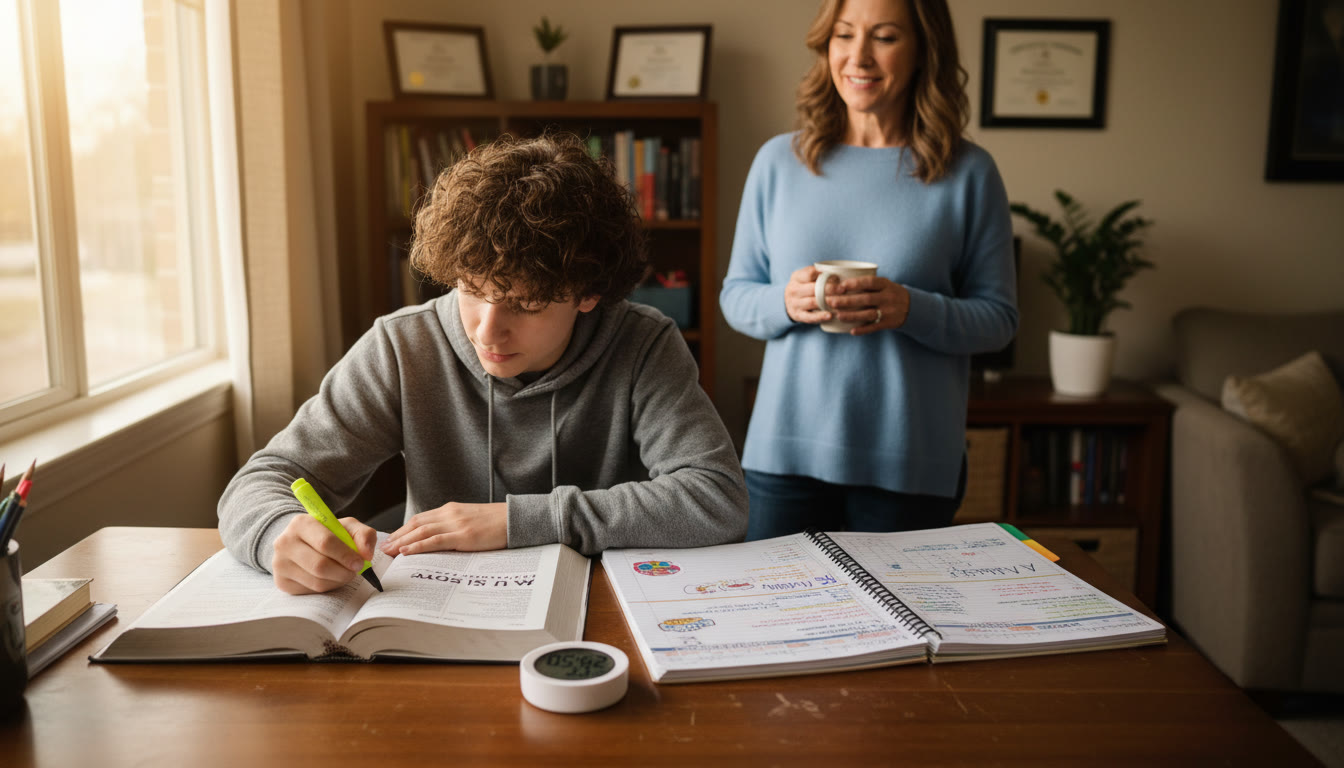Why Screen Time Feels Like a Battlefield During AP Season
It’s spring again: practice tests, flashcards, and the slow crescendo of pressure that surrounds Advanced Placement (AP) exams. For parents, this season often brings a familiar knot in the stomach—the same week you ask your teen to focus, the phone buzzes louder, TikTok compiles a new sequence, and a five-minute scroll becomes an hour. Suddenly, what started as a helpful break spirals into a face-off between parent and child.
Let’s be honest: nobody loves power struggles. They drain energy, damage trust, and often backfire—teens dig in, and parents tighten controls. But you don’t need to choose between total freedom and authoritarian lockdown. The goal is calmer, smarter screen-time management that respects your teen’s growing autonomy while protecting their prep time and wellbeing.
Start With Understanding—Not Rules
Before you switch off devices or announce a new rule, try a mental shift: replace ‘control’ with ‘context.’ Screen time is not inherently bad. During AP season, what matters is timing, purpose, and balance. Your teen’s phone can be a study tool (planner apps, practice quizzes, study groups), a social lifeline, or an endless diversion. Sort these uses together with them.
Try a Quick Family Audit
Sit down with your teen for a nonjudgmental inventory. Ask: What apps help you study? When do you feel distracted? Which online activities actually calm you down? The goal isn’t to micromanage—it’s to map patterns so you can design realistic, respectful boundaries.
- Share your own weak spots—admitting you scroll at bedtime models honesty.
- Focus on patterns, not guilt. “You spent two hours on social media last night” is less useful than “When you use social apps after 9 p.m., you feel tired for morning review.”
- Co-create solutions. Teen buy-in is everything.

Design a Schedule That Feels Fair
Blanket bans rarely work. A weekly or daily schedule that balances focused study and intentional downtime does. Use study blocks tied to the teen’s AP course load and natural rhythms (are they morning people or night owls?).
Sample Day: Focused, Flexible, and Human
| Time | Activity | Screen Policy |
|---|---|---|
| 6:30–7:15 a.m. | Quick review or flashcards | Phone allowed for flashcard app only |
| 8:00–3:00 p.m. | School | Normal school phone rules |
| 4:00–6:00 p.m. | Dedicated AP study block | Focus mode on device; distracting apps paused |
| 6:00–7:00 p.m. | Dinner and family time | No screens at table |
| 8:00–9:00 p.m. | Light review or practice test review | Use of laptop for test materials; social apps off |
| 9:30 p.m. | Wind-down | Screens off at least 30–60 minutes before bed |
This table is a starting point—adapt the blocks to match your teen’s AP subjects. For example, a student taking AP Physics might swap morning review for a late-afternoon lab practice, while an AP Language learner may benefit from daily short writing exercises.
Tech Tools That Help—Not Control
Technology can be an ally when used thoughtfully. Instead of relying on parental lockouts that feel punitive, introduce tools that empower your teen to self-regulate.
- Focus modes and app timers: Encourage your teen to set app limits for specific hours. Let them customize permissible apps during study time so it feels self-directed.
- Pomodoro timers: Short, timed sprints (25 minutes focus, 5 minutes break) help preserve attention and make scheduled breaks guilt-free.
- Study apps with accountability: Apps that track study time without invasive monitoring let teens see progress and adjust habits.
When to Use Controls (and When Not To)
Use parental controls as a safety net—not the main strategy. Controls are helpful if your teen struggles to start at all, has problematic late-night use, or when you’re collaboratively testing a new routine. But if controls become a parental thumb on the scale, they often provoke resistance.
Make Breaks Meaningful
One reason screens become a trap is that breaks are defaulted to scrolling. Teach ‘active breaks’—small activities that restore focus without pulling your teen into an emotional spiral.
- Physical movement: A 10-minute walk, stretching, or jumping jacks.
- Micro-chores: Tidying a desk or emptying the dishwasher feels productive and restores control.
- Non-screen hobbies: Drawing, a quick puzzle, or practicing an instrument.
Encourage your teen to create a ‘break menu’—a list of three go-to activities they can pick from during each study break. When kids choose, they feel more in control and are less likely to default to doomscrolling.
Communication Over Consequences
Talking beats threatening. During AP prep, your teen is processing identity, stress, and growing independence. Listen to how they describe their distractions—often, it’s not digital temptation but anxious avoidance. When you respond to the feeling (anxiety about an upcoming AP exam) rather than the behavior (scrolling), you reach the root.
Try This Script
“I noticed you were on your phone a lot after practice tests. Are you using social time to relax, or does it feel like avoidance because the tests make you nervous? I want to help.”
This opens a conversation rather than triggering defensiveness. Co-create solutions: if avoidance is the issue, brainstorm short, manageable tasks they can do after a practice test; if relaxation is needed, schedule it deliberately.
Teach Self-Regulation Skills—Not Just Rules
Ultimately you want your teen to leave home with strong time-management instincts. Empower them with skills that transfer beyond AP season.
- Goal setting: Break AP goals into weekly targets—content areas, practice tests, and review cycles.
- Reflection: Weekly quick check-ins—what helped, what drained energy?
- Decision frameworks: Teach them to ask—Is this screen time restorative, social, or avoidance?
How Study Support Reduces Screen Conflicts
Many power struggles happen because a teen feels overwhelmed: when the workload seems insurmountable, the brain seeks quick rewards. This is where targeted academic support helps. When study plans are clear and progress is visible, teens are less likely to seek avoidance by scrolling.
For example, Sparkl’s personalized tutoring can provide one-on-one guidance and tailored study plans that break AP content into manageable, proven steps. With expert tutors and AI-driven insights, students receive focused review sessions that build confidence—and remove the ‘I’ll do it later’ habit that often leads to late-night screen binges.
What Good Tutoring Adds to the Mix
- Accountability without nagging: Regular sessions create natural rhythms for focused work.
- Tailored practice: Targeted question banks and feedback focus on weak spots, so study time is efficient.
- Emotional support: Tutors often coach study strategies and coping techniques, reducing exam anxiety that fuels avoidance.
Family Habits That Make Boundaries Stick
Habits are social. When the household models mindful screen use, teens follow more readily.
- Device-free mealtimes: A quick way to promote presence and check in emotionally.
- Shared rituals: A 10-minute family walk after dinner doubles as movement and communication time.
- Visible chargers: Having a common charging station outside bedrooms encourages better sleep hygiene.
How to Avoid the Lecture Spiral
Lectures escalate resistance. Instead, use curiosity and collaborative problem-solving. Ask, “What’s one small change we could try this week to help your AP study?” Give the teen leadership over the experiment and agree to revisit results in a week. This scientific approach reduces drama and boosts agency.
Recognize Burnout Signals Early
AP workload and screens both impact sleep, mood, and motivation. Watch for creeping signs of burnout: irritability, declining grades despite heavy effort, disrupted sleep, or apathy toward activities they used to enjoy.
- If you see these signs, prioritize rest and recalibration over pushing harder.
- Short-term reductions in study time paired with focused tutoring sessions can actually improve long-term retention and performance.
Practical Scripts for Common Moments
Here are short, low-conflict phrases you can use when tension is rising.
- “Can we test this schedule for one week and see how it goes?”—invites trial over decree.
- “I trust you to start at 4 p.m.—how will you let me know you’ve begun?”—gives responsibility with light accountability.
- “I noticed you looked tired after studying late—want to try a different approach?”—links behavior to wellbeing, not punishment.
Quick Troubleshooting: When Rules Fail
If a plan collapses, don’t double down on enforcement. Take a step back and ask what blocked success. Was the schedule unrealistic? Was the teen facing social stress? Did they need targeted subject help? Often the right move is not a stricter rule but better alignment—fewer, clearer commitments that the teen helps design.
Putting It Into Practice: A Two-Week Plan
Want a short, practical roadmap? Try this two-week experiment designed to reduce screen power struggles while boosting focused AP prep.
- Week 1, Day 1: Family audit and co-created schedule. Pick one study block to pilot and decide which apps are off-limits during it.
- Week 1, Days 2–7: Use Pomodoro sprints during study blocks; encourage active breaks. Parents practice curiosity, not correction, at check-ins.
- Week 2, Days 8–10: Introduce one tutoring component—an expert tutor session or targeted online review. Track how much time is spent studying versus distracted.
- Week 2, Days 11–14: Revisit the audit. Celebrate wins, adapt what didn’t work, and solidify the habits that did.
Final Thought: Aim for Trust, Not Total Control
Managing screen time through AP season isn’t about confiscating phones or enforcing draconian rules. It’s about teaching teens to manage their attention, matching structure to their developmental needs, and providing resources that make focused study easier and less stressful. When your teen feels supported—not policed—they’re more likely to choose the healthy path on their own.
And remember: a small investment now—clear plans, empathetic conversations, and the occasional tutoring boost from services like Sparkl—can make the months of AP study more productive and less combative. You’re helping your child learn skills that outlast a single exam: discipline, self-awareness, and the ability to balance work and rest. Those are wins worth fighting for, but they’re easier won without a fight.

Quick Resources to Try Tomorrow
- Set one 90-minute study block with two 10-minute active breaks.
- Create a simple ‘break menu’ of three non-screen activities.
- Schedule one tutoring session or targeted review for the upcoming weak subject—short, focused, and supportive.
Start small. Adjust. Trust the process. Your calm leadership and partnership will make the AP season a growth experience, not a battleground.
Wishing you and your teen a focused, confident, and relatively peaceful AP season.
















No Comments
Leave a comment Cancel